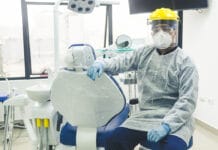On the surface, it may seem that psychological conditions and dental issues, such as periodontitis, haven’t much to do with each other, but researchers in Taiwan beg to differ. Thanks to the Taiwan National Health Insurance (NHI), 99% of the Taiwanese population is routinely checked by a dentist, and any problems identified are appropriately addressed. The NHI program does more than support the dental health of the entirety of Taiwan; all the medical and dental information gathered by dental professionals is collected giving researchers interested in health and/or dentistry a plethora of information to support or negate their theories.
One positive that comes from everyone’s information in one database is that the information you seek is right at your fingertips and researchers can draw lines and find parallels between two subjects that many observers may not have thought to compare. The study, Association Between Periodontitis and Bipolar Disorder: A Nationwide Cohort Study, explores the hypothesis that periodontitis can increase a person’s risk for bipolar disorder.
This particular group of researchers discovered that people with periodontitis are at a higher risk of developing BPD than people who do not have periodontitis.
How Would Periodontitis Lead to Bipolar Disorder?
We know that periodontitis leads to inflammation that can easily spread throughout the body and severely increase any inflammation already present anywhere. This chronic inflammation can reach the hypothalamic-pituitary-adrenal (HPA) axis which includes the hypothalamus, the anterior lobe of the pituitary gland, and the adrenal gland. Current researchers have discovered that bipolar disorder either causes or is caused by neuroinflammation in the same system.
Proinflammatory cytokines decrease tryptophan and stalls serotonin synthesis in periodontitis support the oxidative stressors, nitrosative stressors, and tryptophan catabolites in bipolar disorder. Many studies have proven a tie between dementia and periodontitis, which all cause inflammation in the HP axis. This can also be the reason there is a connection between dementia and bipolar disorder. Periodontitis can exacerbate dementia.
Other Findings, Beyond Inflammation
Beyond the subject of inflammation, there seems to be a correlation between periodontitis and smoking cigarettes as well as a connection between BPD and cigarette smoking because smoking usually accompanies a lower level of serotonin. Both BPD sufferers and those with periodontitis have increased numbers of COPD diagnoses when compared to the rest of society.
The numbers highlight the increase in problems caused by periodontitis, besides BPD, such as hyperlipidemia, stroke, and major depressive disorder. More females suffered from both diseases together than men do. Women also tend to suffer from more thyroid problems than men do and thyroid problems have a direct effect on periodontitis.
Conclusions
The incredible amount of documentation added into this database supports this theory pretty strongly. But there are limitations in the information available. For example, the severity and type of bipolar disorder during the diagnosis of periodontitis weren’t always documented well in the data, especially because it contains only the information gained by dental staff.
Also, dental procedures increase a person’s level of anxiety naturally, so measuring the severity of bipolar symptoms would be more complex than this specific study could do. There are many times when bipolar disorder is present and not diagnosed or reported. It can also be easily misdiagnosed.
This study only looked at finding a connection between the two diseases, not in proving the essential details of the connection.
The limitations in the study that are usually based on the lack of necessary and specific information that is essential to conclusively prove this theory. So, it remains a theory, but one with strong proof of connections that deserves further study. A proven connection could change the approach that both doctors and dentists approach and treat each condition.











